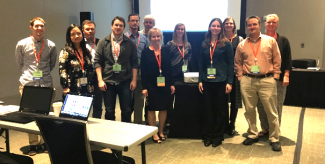A major hurdle for running new software systems is often building and compiling the necessary code on a particular computer platform. In recent years, the concept of using “containers” has been gaining momentum in the numerical weather prediction (NWP) community. This new container technology allows for the complete software system to be bundled (operating system, libraries, code, etc.) and shipped to users in order to reduce the spin-up time, leading to a more efficient setup process. A core mission of the DTC is to assist the research community in efficiently demonstrating the merits of new model innovations. The development and support of end-to-end NWP containers is in direct support of that mission.
In recent years, a number of NWP software components (including pre-processing, the model itself, post-processing, graphics generation, and statistics computation and visualization) were implemented into Docker containers to better assist the user community. The work conducted by DTC staff leveraged previous efforts of the Big Weather Web (http://bigweatherweb.org), which initially established software containers for the WRF Pre-Processing System (WPS), Weather Research and Forecasting (WRF) model, and NCAR Command Language (NCL) components. From there, DTC staff expanded the containerized tools to include the Unified Post-Processor (UPP), Model Evaluation Tools (MET), and METViewer. Through this complementary work, a full end-to-end NWP system was established, allowing for verification of the model output and visualization of the statistical output.
Several DTC staff (Kate Fossell, John Halley Gotway, and Tara Jensen, and Jamie Wolff) hosted a short course at the 98th Annual AMS meeting in Austin, TX on 6 January 2018 that offered hands-on experience with the established software containers. In preparation for the short course, an online tutorial was created that can be accessed at: https://dtcenter.org/met/docker-nwp/tutorial/container_nwp_tutorial/index.php. If you are an undergraduate/graduate student, university faculty, or researcher who is interested in these new tools, please check it out! Participants of the 2018 short course were complementary of the day-long tutorial, and the DTC plans to offer it again next year at the Annual meeting in Phoenix, AZ – stay tuned for more information regarding future training opportunities.
